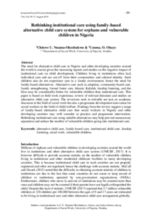Displaying 721 - 730 of 2221
This study draws on in-depth interviews with eight foster care couples and explores how foster carers construct practices around bodily care and touch in new foster care relationships.
This study tested a web‐based parenting course called FosterParentCollege.com (FPC) Culturally Competent Parenting (CCP) for transracial foster and adoptive parents.
For this study, a general sample of the New South Wales (NSW) public completed an online survey about adoption practices and their willingness to consider adopting from out-of-home care, with background questions on perceived social support and life satisfaction.
This paper is based on field work experience, review of relevant literature and studies on alternative child care system in Nigeria.
This theoretical paper focuses on early-stage planning in young adults in transition from out-of-home care in the UK.
This theoretical paper focuses on early-stage planning in young adults in transition from out-of-home care in the UK.
The aim of the study was to examine sex differences in self‐reported psychological distress, behavioural and emotional problems, and substance use in young people living in out‐of‐home care (OoHC) in metropolitan Melbourne, Australia.
This article draws on national data and quantitative data from a study of ‘City’, a local authority in the north of England with a large Family Group Conference service.
This study examined foster parent physical and mental health over time.
This article explores how the type of placement in children's social care influences identity formation and contact with the birth family. It draws on 40 life history interviews with Romanian-born, care experienced young people who entered adulthood from different types of placement: 16 from residential care, eight from foster care, seven from domestic adoption and nine from intercountry adoption.

